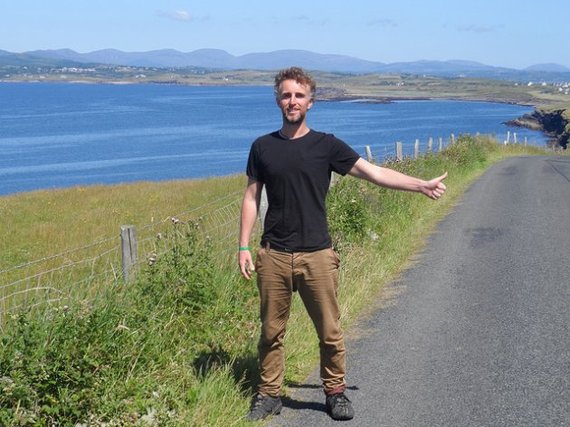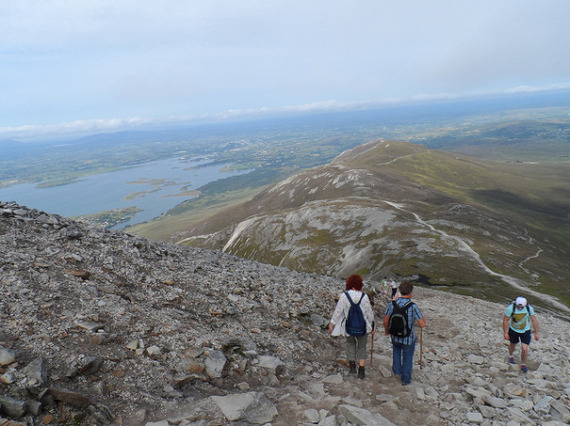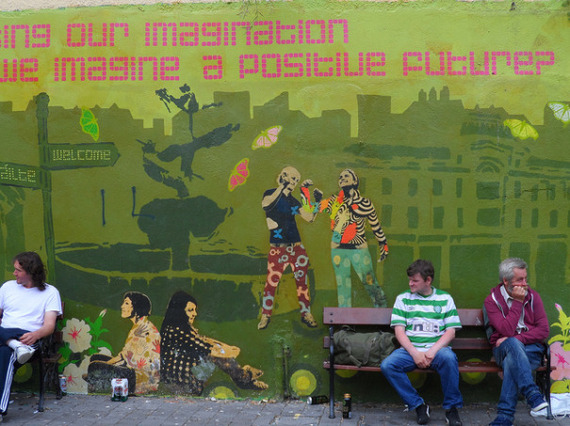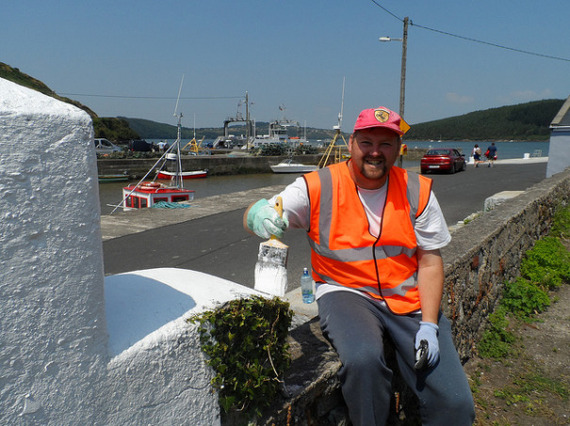During July 2013 I hitch-hiked around Ireland, recording people's voices and visions for the country, on what I called the 'hitching for hope' listening tour. I dreamed up the idea as a way of informing my speech at the MacGill Summer School about citizen's views on democracy at what is a critical time in Ireland's history.
On the trip I met people from all walks of life, including barristers and businessmen, unemployed and homeless people, islanders on Inishbofin, farmers in Connemara, Orangemen in Derry, community activists in Moyross, and monks in Glenstal.
Here are a few things I discovered along the way.
1. Sometimes you have to take a leap of faith
Several people said I was mad to go hitching. On top of this I had my own doubts. I am in debt. I didn't have a plan, money, or equipment. I thought maybe I should just stay at home, be sensible, find some paid work to cover my rent, spend time with my fiancée, and cop myself on. Still, the idea kept calling to me - so I said 'what the hell' and jumped into the unknown.
As soon as I did, doors started to open. Not just car doors, but offers of money, food, places to stay, media interviews, and no shortage of people willing to share their hopes, dreams and stories of love and loss. Letting go of my fears and worries of what other people thought, and trusting in the unknown, gave me the adventure of a lifetime and a new hope for the future.
2. Hitching is alive
My average waiting time was about five minutes and I'd regularly get picked up within a minute of sticking my thumb out. The longest I had to wait was 40 minutes. Eighty per cent of lifts were from men; there's no doubt that the hitching world isn't something that's equally accessible to women for safety reasons. I got picked up by people from all walks of life including a butcher, a fish monger, a priest, an ex-priest, a beekeeper, a businesswoman, tourists, a social worker, and a software engineer. All were mad to chat. You can hear some of the in-car audio interviews on my website.
3. There is another Ireland
Sometimes you can end up thinking we're the most miserable, depressed, oppressed and hopeless nation on earth. We're not. Ireland might not be well reflected by our leaders or institutions and the effects of unemployment, emigration and austerity are not to be ignored, but everywhere I went I witnessed kindness, generosity, creativity and signs of hope, courage and possibility. Within communities people are working hard, volunteering, campaigning, supporting charities, innovating, and doing their best to embody the values of a different Ireland. Despite everything we've faced, there remains a great spirit among the people.
4. People are angry
But while I encountered no shortage of smiles and welcomes, there is no doubt that people are angry about the continuing abuses of church, State and corporate power. There is a sense that there is one law for the rich and another for the rest of us, and in many cases this is feeding anger, depression, despair and cynicism. There is an appetite for revolution, reform, and renewal and a sense that we have to find new ways of coming together and getting organized.
5. People are thinking about values
While global, national and personal crises can be traumatic and painful, they can also be times for reflection and an opportunity for radical change. Many people I talked to mentioned the need to get back to basics. They spoke about the need to get away from individualism and cultivate community spirit, to cut down on all the noise and clutter and find simpler ways of living while connecting with friends, family, neighbours and nature.
6. We have other ideas
All over the country people are innovating and coming up with new ideas for job creation, political reform, and the transformation of things like health, education, energy, food, and agriculture. People don't believe the government message that there is no alternative to austerity and they have different visions for how we can run this country and make it a world leader in science and technology, participative democracy, and in green food, farming and energy production.
7. We're tough
Talking to historians and older people on the trip helped give me a sense of the turbulent times this country has been through. Older Irish people have witnessed mass poverty, emigration and the era of the industrial schools. One historian talked about the mass killings of the Cromwellian era when thousands of Irish people were murdered. He said that we are at the end of one cycle of history and the beginning of another and that we are a tough and resilient people. The challenge now is to take the lessons from history and to learn from them.
8. This is a paradise island
Chatting to tourists helped give me perspective on how they see the country (clean, green, spacious, safe, peaceful, and friendly) as did visiting some of our world class scenic and historic sites. Fair enough, the weather is bad a lot of the time but it's worth considering the pollution, climate chaos, overpopulation, poverty or violence that so many other countries have to contend with. Overall, and notwithstanding the obvious suffering, we have it relatively good.
9. It's important to listen
I called my trip a listening tour as I think there's often too much talking and not enough listening, not just at a political level but in our day to day lives. My work with young people has taught me that listening to people can be therapeutic and empowering. Listening to different perspectives without reacting or debating also helps you see another view on things. Listening requires focus, attention, and awareness. Listening to yourself is equally important; to your gut instinct, intuition, inner voice, or whatever you want to call it.
10. It's up to us
If we wait for the government to solve our problems then we will be waiting a long time. Ultimately the responsibility of transforming Ireland and transforming our lives is up to us all. We have the power to decide what we do with our time, our thoughts, our money and our votes. Many of us have serious life challenges to contend with but there is always room for manoeuvre in how we perceive situations, and how we approach each day. It is up to each of us to help build the world we want to create.
More information on the hitching for hope trip
Ruairí McKiernan is a social justice campaigner, freelance community worker, and Presidential appointee to Ireland's Council of State. His website is www.community.ie and he is on twitter @ruairimckiernan and on Facebook www.facebook.com/hopehitching



